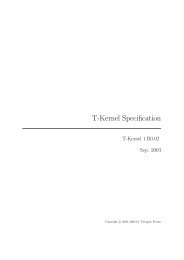[8] 2002 e-business-strategies-for-virtual-organizations
[8] 2002 e-business-strategies-for-virtual-organizations
[8] 2002 e-business-strategies-for-virtual-organizations
Create successful ePaper yourself
Turn your PDF publications into a flip-book with our unique Google optimized e-Paper software.
e-<strong>business</strong> and the <strong>virtual</strong> organization<br />
an especially important trans<strong>for</strong>matory role. Shepard, writing<br />
in Business Week, claims that:<br />
In<strong>for</strong>mation technology . . . is, in short, a transcendent technology –<br />
like railroads in the 19th century and automobiles in the 20th century.<br />
(Shepard 1997)<br />
Mandel, another Business Week writer, claims that the:<br />
New economy – so far propelled by in<strong>for</strong>mation technology – may turn<br />
out to be only the initial stage of a broader flowering of technological<br />
<strong>business</strong> and financial creativity. (Mandel 1998)<br />
Connected to the pre-eminent role given to IT and its potentially<br />
trans<strong>for</strong>ming power, has been the important role given to<br />
knowledge as a new <strong>for</strong>m of capital, and the role of knowledge<br />
management, as well as research and innovation as wealth<br />
creating factors.<br />
Another element of the new economy construct is the increasingly<br />
important role of the service sector. We can choose to see<br />
the evolution of economies from an agrarian-based economy<br />
through an industrial economy through to a service economy<br />
and then on to the emergence of an experience economy. Each<br />
economic stage has all the elements of preceding and succeeding<br />
stages, but the focus and emphasis are different. The contemporary<br />
economies of the developed world can be seen to be new in<br />
terms of their emphasis on producing and delivering services<br />
and the emerging idea of staging complete experiences <strong>for</strong><br />
consumers. Of course, modern, new economies examined along<br />
this plane are only different in degree from the older economies<br />
of 20 years ago, but this difference in degree could be seen as a<br />
‘strand of newness’ in the ‘new economy’. Thus we see that the<br />
nature of the new economy has many and varied aspects of<br />
novelty, and these are given different degrees of emphasis by<br />
different thinkers, as we shall see throughout this book.<br />
Economists are examining the new IT-based <strong>organizations</strong> and<br />
the economic world they shape, but have come to no agreement<br />
yet on whether there are new economic laws to be discovered, or<br />
whether the old economy macroeconomic principles and technical<br />
relationships still apply. For some it is a given that, while<br />
technology may change, economic laws do not. Perhaps it is too<br />
soon to hold any definite views on this. As we shall see, the<br />
potential <strong>for</strong> new <strong>business</strong> and organizational <strong>for</strong>ms resulting<br />
from a still-developing set of technologies has yet to be properly<br />
mapped out, and we are all still learning.<br />
3


![[8] 2002 e-business-strategies-for-virtual-organizations](https://img.yumpu.com/8167654/22/500x640/8-2002-e-business-strategies-for-virtual-organizations.jpg)












